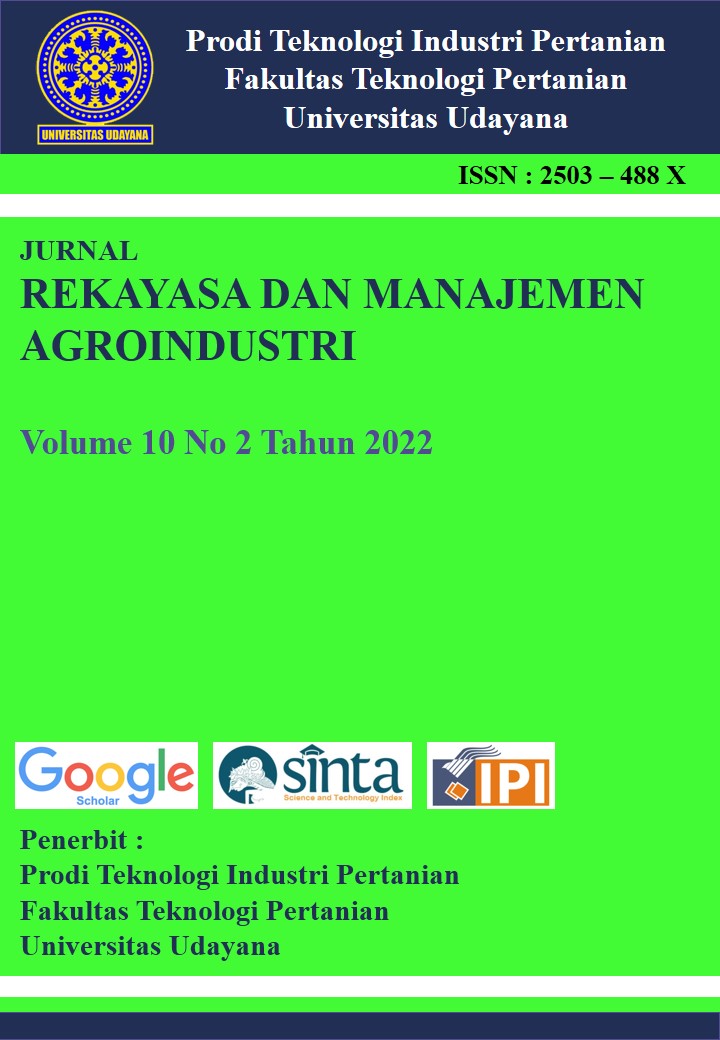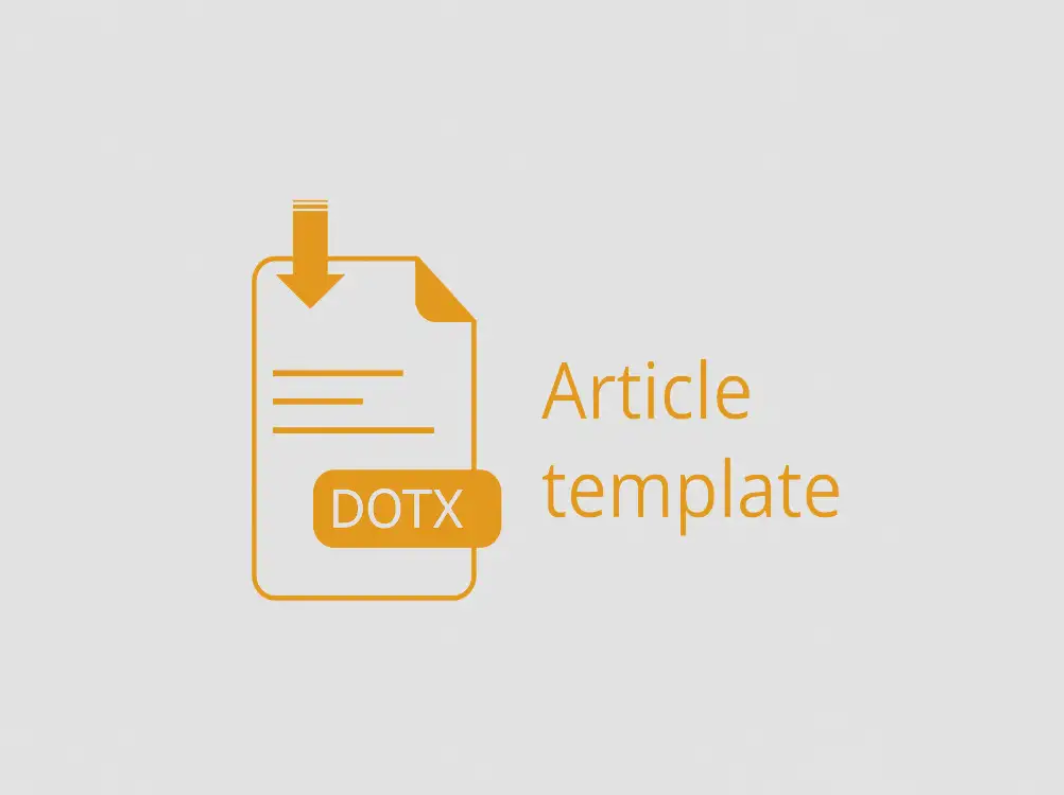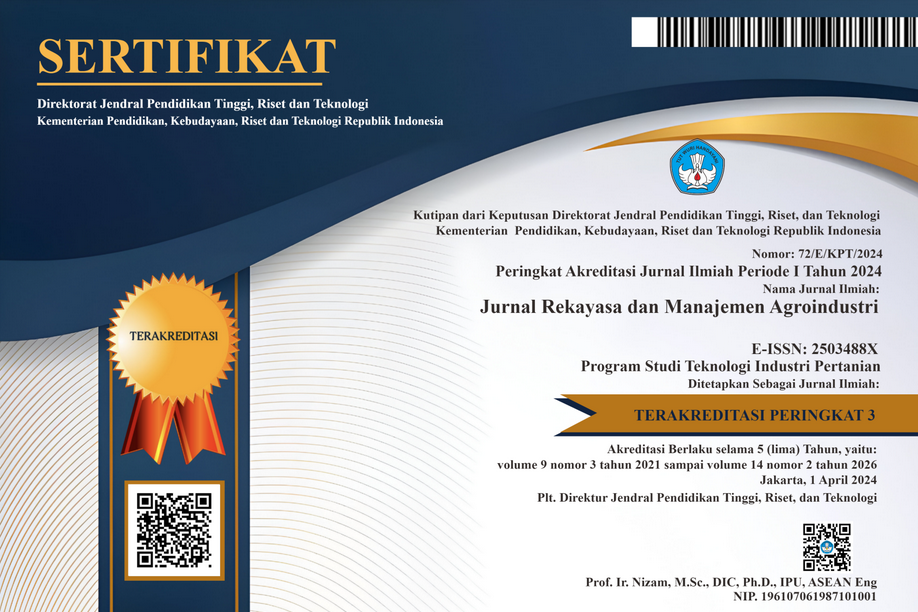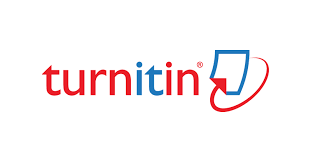KARAKTERISTIK ENKAPSULAT EKSTRAK ASETON DAUN SINGKONG (Manihot esculenta C.) PADA PERLAKUAN JENIS DAN KONSENTRASI ENKAPSULAN
Abstract
Cassava leaf extract can be developed as a natural food coloring. Food coloring from cassava leaf acetone extract is made in powder form to make it easier to use and more stable in storage. This study aims to determine the effect of the type and concentration of encapsulation on the characteristics of the acetone extract of cassava leaf natural dye and determine the best type and concentration of encapsulant to obtain cassava leaf natural dye acetone extract encapsulate. This study used a factorial randomized block design with two factors. The first factor is the type encapsulant (maltodextrin and gum arabic) and the second factor is the concentration (5%, 10%, and 15%). The objective data obtained was then tested by analysis of variance and if there was an effect of treatment on the observed variables, the analysis was continued with the Tukey test. The results showed that treatment interactions had an effect on, yellowness level (b*), total chlorophyll and encapsulation efficiency but had no effect on yield, water content, redness level (a*), brightness level (L*). Treatment of gum arabic type with a concentration of 10% is the best treatment to produce acetone extract encapsulate natural dye of cassava leaves with yield characteristics of 95,55%, water content 10,69%, solubility 89,50%, the total chlorophyll was 3.42%, brightness level (L*) of 21,21, the level of redness (a*) was 6.30, the level of yellowness (b*) was 13.18, and the encapsulation efficiency was 89.73%.
Downloads
References
AOAC, (1999). Official Methods Analysis (15th Ed.) K. Helrich (Ed.), Virginia
Ernawati, U. R., L. U. Khasanah., & R.B.K. Anandito. (2014). Pengaruh variasi nilai dextore equivalents (DE) maltodekstrin terhadap karakteristik mikroenkapsulasi pewarna alami daun jati (Tectona grandis L.F.). Jurnal Teknologi Per-tanian. (15), 111-120.
Glicskman. (1983). Food Hydrocolloid. Vol II. CRC Press Inc Boca Raton. Florida
Hui, Y. (2006). Handbook of Food Science Technology and Enginering Volume I. CRC Press, USA.
Khuluq, A. D., S.B. Widjanarko & E.S. Murtini. (2007). Ekstraksi dan betasianin daun dara (Alternanthera dentata) (kajian perbandingan pelarut aircetanol dan suhu ekstraksi). Jurnal Teknologi Pertanian. 8(3), 172-181
Nollet, L.M.L. (2004). Handbook of Food Analysis Physical Characterzati- ion and Nutrient Analysis. Marcel Dekker Incor-poration, New York.
Palupi N.W., P.K.J. Setiadi, & S. Yuwanti. (2014). Enkapsulasi cabai merah dengan teknik coacervation menggunakan alginat yang disubstitusi dengan tapioka terfotooksidasi. Jurnal Aplikasi Teknologi Pangan. 3(3), 87-93.
Purnomo, W., L. U. Khasanah & R. B. K. Anindito.( 2014). Pengaruh ratio kombinasi maltodekstrin, karagenan dan whey terhadap karakteristik mikroenkapsulasi pewarna alami daun jati (Tectona grandis L). Jurnal Aplikasi Teknologi Pangan. 2(3), 121-129.
Puspitaningrum, D. (2003). Pengaruh Jenis Bahan Pengisi dan Proporsi Filtrasi; Bahan Pengisi Terhadap Sifat Fisik, Kimia dan Organoleptik Bubuk Sari Buah Jambu Biji. [Tidak dipublikasikan. Skripsi]. Institut Pertanian Bogor.
Rizqita, H., B. S. L. Jenie, N. Nurhidayati, C.C. Nurwitri. (2009). Karakteristik mikrokapsul probiotik Lactobacillus planta-rum yang dienkapsulasi dengan susu skim dan gum arab. J. Indon. Trop. Anim. Agric. 34(2), 139-144.
Sekali, E.E.K., N.M. Wartini & L. Suhendra. (2020). Karakteristik ekstrak aseton pewarna alami daun singkong (Manihot esculenta C.) pada perlakuan ukuran partikel dan lama maserasi. Jurnal Ilmiah Teknologi Pertanian. 5(2,:49-58.
Setiari. N. & Y. Nurchayati. (2009). Eksplorasi kandungan klorofil pada beberapa sayuran hijau sebagai alternatif bahan dasar food supplement. Jurnal Bioma. 11(1), 6-10.
Sudarmadji, S., Suhardi & B. Haryono. (1989). Analisa Bahan Makanan dan Pertanian. Penerbit Liberty, Yogyakarta.
Sugindro, E., Mardiyati & J. Djajadisastra. (2008). Pembuatan dan mikroenkapsulasi ekstrak etanol biji jinten hitam pahit (Nigella sativa L.) Majalah Ilmu Kefarmasian, 5(2,: 57-66.
Supriyadi & S.A. Rujita. (2013). Karakteristik mikrokapsul minyak atsiri lengkuas dengan maltodekstrin sebagai enkapsul-an. Journal Teknologi dan Industri Pangan. 24(2),201-208.
Wartini, N.M & G.P. Ganda Putra. (2018). Karakteristik enkapsulat pewarna buah pandan pada perlakuan jenis dan konsen-trasi enkapsulan. Media Ilimiah Teknologi Pangan. 5(2), 139-148.
Weaver, C. (1996). The Food Chemistry Laboratory. CRC Press, Boca Raton, New York, Londo.

Ciptaan disebarluaskan di bawah Lisensi Creative Commons Atribusi-BerbagiSerupa 4.0 Internasional.
Seluruh artikel di Jurnal ini dapat disebarluaskan atas tetap mencantumkan sumber yang syah. Identitas judul artikel tidak boleh dihilangkan. Penerbit tidak bertangggung jawab terhadap naskah yang dipublikasikan. Isi artikel menjadi tanggung jawab Penulis.














